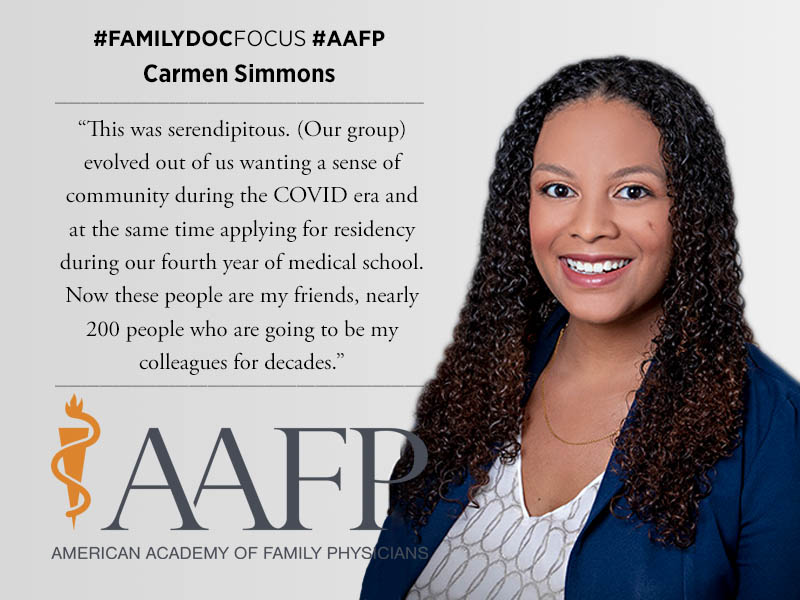Med Student Is Helping Black Applicants Find Their Match
November 30, 2020, 12:50 pm David Mitchell -- In January, not long before the COVID-19 pandemic was declared a public health emergency, a large group of Black medical students who were connected online formed a subgroup for those applying to family medicine residencies in the 2021 Match.

Students were using the messaging app GroupMe to talk about research projects and conferences, and to socialize. Little did they know how important that group would become in their searches for the next stop in their training.
“We weren’t going into anything really specific about family medicine at that point, but we knew that’s what we wanted to do,” said Carmen Simmons, a fourth-year student at Meharry Medical College in Nashville, Tenn. “When the world shut down, we were really bummed out trying to figure out what was going to happen with our clerkships. By May, we were in despair.”
Simmons suggested students connect for a virtual happy hour and then invited some family medicine residents for good measure.
“I started wondering, would residents do a webinar with us?” said Simmons, who founded the Association of Black Family Medicine Applicants. “That set it off.”
As students navigate a virtual Match process, the association has engaged with more than 20 residency programs in Zoom sessions. Some events have offered program-specific information, while others have helped students with things like personal statements or mock interviews.
Simmons moderates discussions, asking questions that students raise so potential applicants don’t have to directly ask programs about sensitive issues like racism in their communities or diversity in their programs.
“We want to know that we are going to be safe and comfortable in the community we’re going to,” she said. “It isn’t that white students aren’t asking the same question, but this is at the forefront of our minds; it’s not the fourth or fifth thing on our list.”
The group, which had matched dozens of students with family medicine residents and attendings for mentoring, has drawn allopathic and osteopathic students from dozens of schools across the country and the Caribbean, as well as international medical graduates.
“This was serendipitous,” Simmons said. “It evolved out of us wanting a sense of community during the COVID era and at the same time applying for residency during our fourth year of medical school. Now these people are my friends, nearly 200 people who are going to be my colleagues for decades. It’s really fun. It’s all been by word of mouth. One person adds another and it snowballs. It’s a new way to offer support.”
Simmons already has interviewed with multiple programs that have interacted with the group. She’s planning a post-Match survey to assess the effectiveness of the group by looking at whether students applied, interviewed or matched with a participating program and how to improve the process in the future. She wants to identify a student to take over the group for the 2022 class.
Simmons hopes to match with a program that will prepare her to be a full-scope family physician, including obstetrics.
“I’m very passionate about that,” she said. “Family medicine with OB offers everything I want.”
Simmons worked as a doula through the YWCA in Greensboro, N.C., and later as a care assistant at the University of North Carolina at Chapel Hill Division of General Internal Medicine and Clinical Epidemiology before medical school.
“I was really excited and wondering, ‘Should I do OB or internal medicine? How do I decide?’” she said. “Then I attended a lecture during my first year of med school on family medicine with OB, and I was like, ‘Oh my gosh, that’s what I want to do.’”
Medical students and residency programs can contact the Association of Black Family Medicine Applicants by email.